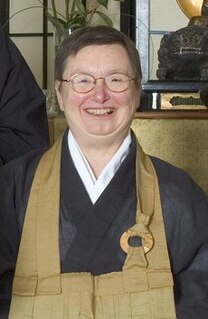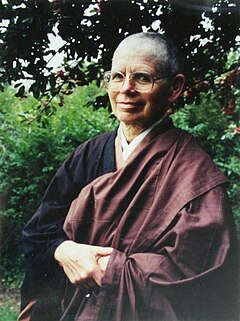Related Research Articles
Sōtō Zen or the Sōtō school is the largest of the three traditional sects of Zen in Japanese Buddhism. It is the Japanese line of the Chinese Cáodòng school, which was founded during the Tang dynasty by Dòngshān Liánjiè. It emphasizes Shikantaza, meditation with no objects, anchors, or content. The meditator strives to be aware of the stream of thoughts, allowing them to arise and pass away without interference.
The purpose of this timeline is to give a detailed account of Buddhism from the birth of Gautama Buddha to the present.

Soyen Shaku was the first Zen Buddhist master to teach in the United States. He was a Rōshi of the Rinzai school and was abbot of both Kenchō-ji and Engaku-ji temples in Kamakura, Japan. Soyen was a disciple of Imakita Kosen.

Zentatsu Richard Baker, born Richard Dudley Baker, is an American Soto Zen master, the founder and guiding teacher of Dharma Sangha—which consists of Crestone Mountain Zen Center located in Crestone, Colorado and the Buddhistisches Studienzentrum (Johanneshof) in Germany's Black Forest. As the American Dharma heir to Shunryu Suzuki, Baker assumed abbotship of the San Francisco Zen Center (SFZC) shortly before Suzuki's death in 1971. He remained abbot there until 1984, the year he resigned his position after it was disclosed in the previous year that he and the wife of one of SFZC's benefactors had been having an ongoing affair. Despite the controversy connected with his resignation, Baker was instrumental in helping the San Francisco Zen Center to become one of the most successful Zen institutions in the United States.

Buddhism, once primarily practiced in Asia, is now also practiced in the United States. As Buddhism does not require any formal "conversion", American Buddhists can easily incorporate dharma practice into their normal routines and traditions. The result is that American Buddhists come from every ethnicity, nationality and religious tradition. In 2012, U-T San Diego estimated U.S. practitioners at 1.2 million people, of whom 40% are living in Southern California. In terms of percentage, Hawaii has the most Buddhists at 8% of the population, due to its large Asian American community.

Sanbo Kyodan is a lay Zen sect derived from both the Soto (Caodong) and the Rinzai (Linji) traditions. It was renamed Sanbo-Zen International in 2014. The term Sanbo Kyodan has often been used to refer to the Harada-Yasutani zen lineage. However, a number of Yasutani’s students have started their own teaching lines that are independent from Sanbo Kyodan. Strictly speaking, Sanbo Kyodan refers only to the organization that is now known as Sanbo-Zen International.

Hakuyū Taizan Maezumi was a Japanese Zen Buddhist teacher and rōshi, and lineage holder in the Sōtō, Rinzai, and Sanbo Kyodan traditions of Zen. He combined the Rinzai use of kōans and the Sōtō emphasis on shikantaza in his teachings, influenced by his years studying under Hakuun Yasutani in Sanbo Kyodan. He founded or co-founded several institutions and practice centers, including the Zen Center of Los Angeles, White Plum Asanga, Yokoji Zen Mountain Center and the Zen Mountain Monastery.

James Ishmael Ford is an American Zen Buddhist priest and a retired Unitarian Universalist minister. He was born in Oakland, California on July 17, 1948. He earned a BA in psychology from Sonoma State University, as well as an M.Div. and an MA in the Philosophy of Religion, both from the Pacific School of Religion.

Anne Arundel Hopkins Aitken was an American Zen Buddhist, in the Harada-Yasutani lineage. She co-founded the Honolulu Diamond Sangha in 1959 together with her husband, Robert Baker Aitken. She purchased both of its properties: the Koko An Zendo and Maui Zendo. Honolulu Diamond Sangha has been considered "one of several pivotal Buddhist organizations critical to the development of Zen" in western countries. Anne Aitken was also one of the original founders of the Buddhist Peace Fellowship.
Charlotte Joko Beck was an American Zen teacher and the author of the books Everyday Zen: Love and Work and Nothing Special: Living Zen.
Shinge-shitsu Roko Sherry Chayat is the current abbot of the Zen Studies Society, based at the International Dai Bosatsu Zendo Kongo-ji monastery, outside Livingston Manor, NY, and at the New York Zendo Shobo-Ji on the Upper east Side of Manhattan. She is also the abbot of the Zen Center of Syracuse Hoen-ji. Chayat is an advocate for the use of meditation in medical settings, with Hoen-ji running the program Well/Being Contemplative Practices for Healing for healthcare professionals.

George Bowman, or Bo Mun Soen sa Nim, is a Zen master and licensed psychotherapist living at Furnace Mountain in Clay City, Kentucky. He received Dharma transmission from Seung Sahn Soen Sa Nim in 1992, and is a former teacher in the Kwan Um School of Zen. He was a founding member of the Providence Zen Center in 1972 and also did koan study with Joshu Sasaki from 1977 to 2003. Furnace Mountain is run by Dae Gak Soen Sa Nim—another former Kwan Um line teacher. He was a resident teacher at the Cambridge Buddhist Association from 1991 to 1999, and in 1994 became a guiding teacher of the Institute for Meditation and Psychotherapy. Today he travels to Boston, Massachusetts most months to lead a "floating zendo" named the Single Flower Sangha. Bowman has given inka to his student David Dayan Rynick, who was the first individual to be acknowledged as a teacher outside of the Kwan Um lineage.
Maurine Stuart, a.k.a. Ma Roshi or Mother Roshi, was a Canadian Rinzai Zen rōshi who was one of the first female Zen masters to teach in the United States. She became president and spiritual director of the Cambridge Buddhist Association in 1979.
Below is a timeline of important events regarding Zen Buddhism in the United States. Dates with "?" are approximate.

Gyokuko Carlson is a Soto Zen roshi and abbess of Dharma Rain Zen Center in Portland, Oregon, United States. She was formerly the co-abbot along with her husband, the late Kyogen Carlson. Carlson and her husband practiced at Shasta Abbey when Jiyu Kennett was the abbess, leaving to found their own center in 1986 when celibacy became a requirement at Shasta Abbey. She has been a practitioner of Zen Buddhism for more than thirty years, and is a member of the American Zen Teachers Association.
The Zen Center of Syracuse, temple name Hoen-ji, is a Rinzai Zen Buddhist practice center in Syracuse, New York, one of the oldest continuously running Zen centers in the United States. Founded in 1972, the center is currently led by Shinge Roko Sherry Chayat Roshi. Originally at 111 Concord Place, the meditation hall is now located in the former carriage house at 266 West Seneca Turnpike and offers Zen practice for laypeople. Several clergy and practitioners live in a house next door and in the Joshua Forman house, where programs are also conducted. The Zen Center of Syracuse began as a group of graduate students from Syracuse University, with Chayat eventually becoming the center's leader. In addition to Zen practice, the center also provides some instruction in Tibetan Buddhism. According to The Encyclopedia of Women and Religion in North America, "The Syracuse Zen Center also leads meditation at Syracuse University, Syracuse area schools, recovery and justice system institutions, hospitals and corporations." The center also won two awards for their restoration of The Forman House from the Preservation Association of Central New York. This house was instrumental during the War of 1812 and the American Civil War, for it was a bandage assembly area for wounded troops.

Maylie Scott, Buddhist name Kushin Seisho, was a Sōtō roshi who received Dharma transmission from Sojun Mel Weitsman in 1998 at Tassajara Zen Mountain Center. She graduated from Harvard University in 1956 and obtained a master's degree in social work from the University of California, Berkeley. According to the book The Encyclopedia of Women and Religion in North America, "Maylie Scott described her primary teaching objective as empowering the sangha by making sure she is the facilitator, not the 'star.'" In addition to her occupation as a social worker, she was also on the Board of Directors for the Buddhist Peace Fellowship (BPF). In addition to serving for the BPF, Scott was also involved with the Buddhist Alliance for Social Engagement and frequently protested the import of weapons at the Concord Naval Weapons Station. A socially engaged Buddhist and teacher at the Berkeley Zen Center, Scott was known for her work in prisons and homeless shelters. Also, during the 1980s she studied under Maurine Stuart and, in April 2000, she founded Rin Shin-ji in Arcata, California. Professor Lloyd Fulton, of Humboldt State University, had once said of Scott that she is, "a strong-willed and organized woman."
Zen was introduced in the United States at the end of the 19th century by Japanese teachers who went to America to serve groups of Japanese immigrants and become acquainted with the American culture. After World War II, interest from non-Asian Americans grew rapidly. This resulted in the commencement of an indigenous American Zen tradition which also influences the larger western (Zen) world.
The Zen tradition is maintained and transferred by a high degree of institutionalisation, despite the emphasis on individual experience and the iconoclastic picture of Zen.
Modern scientific research on the history of Zen discerns three main narratives concerning Zen, its history and its teachings: Traditional Zen Narrative (TZN), Buddhist Modernism (BM), Historical and Cultural Criticism (HCC). An external narrative is Nondualism, which claims Zen to be a token of a universal nondualist essence of religions.
References
- Ford, James Ishmael (2006). Zen Master Who?: A Guide to the People and Stories of Zen . Wisdom Publications. ISBN 0-86171-509-8.
- Taylor, Eugene (1999). Shadow Culture: Psychology and Spirituality in America . Counterpoint. ISBN 1-58243-080-2.
| This Zen-related article is a stub. You can help Wikipedia by expanding it. |